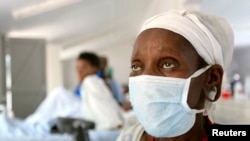A clinical trial to test a new treatment for drug-resistant TB, or XDR-TB, is underway in South Africa. The non-profit TB Alliance and its partners launched the new study called “Nix-TB (New Investigational Drugs for XDR-TB).” The Alliance says the trial is a critical step in the development of a universal treatment for all types of tuberculosis.
It is the first study to test an all-oral drug regimen that has the potential to shorten, simplify and improve treatment for XDR-TB.
“The big difference is the ability to take new drugs that all have not yet been approved. In fact only one of the three has been approved for TB, and after doing quite a bit of pre-clinical work, taking them and using them together,” explained Dr. Mel Spigelman, president and ceo of the Global Alliance for TB Drug and Development. “It really is an attempt to leap frog what otherwise would take probably decades of work if one were to do it in a more conventional manner of getting each drug approved, and only then beginning to study them together.”
The doctor pointed out that XDR-TB patients are treated for “two years or longer with thousands of pills and injections, extensive side-effects and little success.”
In addition he said only about 15% were cured from the disease.
“[In animal models we’ve used], …this treatment can actually cure in about three months. We will be treating patients for six months and for those that have a good response, but don’t appear to be cured at six months, we would go with treatment for another three,” said Spigelman.
The study will start at three centers in South Africa.
“Because of the really experimental nature of the work, we are starting relatively slowly to make sure that we don’t have any unanticipated side-effects or problems. Then we intend to expand it after we get some initial experience with the regimen,” said Spigelman.
He highlighted the major reason XDR-TB has been so difficult to treat is that there has been so little investment in finding new treatments. And treatment loses its effectiveness as resistance builds up.
“So it’s a combination of having out-dated therapies and the lack of investment in trying to find new therapies. That’s why we get resistance that is virtually untreatable. This is not that different from what really we’re beginning to see in a lot of other infections where resistance is really becoming a major problem,” explained the Global Alliance president.
If the trials prove to be successful, the next step includes registering the treatment so it can be used in XDR patients worldwide.
“The second step,” he said, “would be if the treatment is both efficacious enough and safe enough, to actually look at whether this would be a good treatment for multi-drug resistant TB which is not as resistant as the extensively resistant TB which is XDR, and potentially even drug sensitive TB.”
The ultimate goal is to find excellent short term treatment that could be used in all TB patients.
He said successful treatment would allow scientists to continue to develop better drugs to reduce the duration of therapy.




